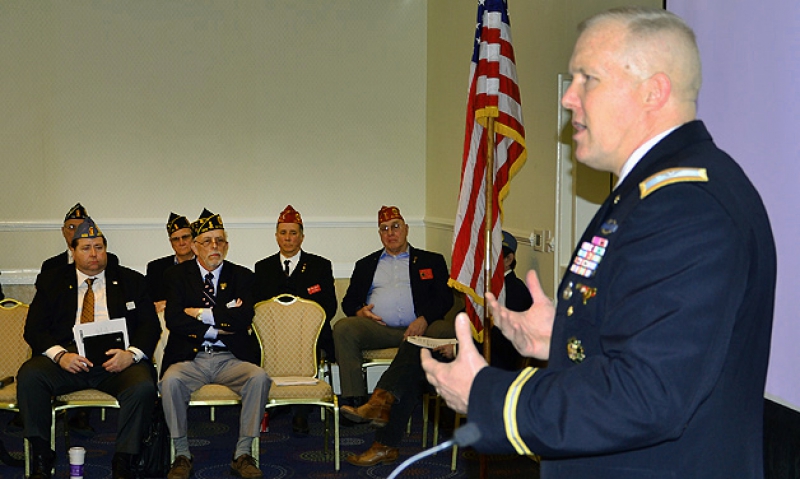
Legion's 2012 legislative priorities
The American Legion’s current legislative policy priorities were highlighted at the Feb. 27 meeting of its National Legislative Commission at the Washington Conference. Inside a room at the Washington Hilton that was packed with Legionnaires, the commission’s chairman, Ken Governor, stressed the important of getting the following key bills passed this year by the 112th Congress:
-
Protecting VA and DoD from the 2011 Deficit Reduction Law. Failure of the "supercommittee" to take action on cutting the federal budget activated an automatic, across-the-board spending cut for January 2013, known as sequestration. This action will affect the Department of Defense (DoD) budget and possibly the Department of Veterans Affairs (VA) budget. The Legion supports bills introduced in Congress that would reverse the sequestration cuts for DoD and VA. The Down Payment to Protect National Security Act (H.R. 3662), introduced by Rep. "Buck" McKeon of California, would delay the cuts for one year; a companion bill was introduced in the Senate by Sen. John Kyl of Arizona. Another bill introduced by Rep. Jeff Miller of Florida, the Protect VA Healthcare Act of 2012 (H.R. 3895), would exempt the VA budget from automatic cuts.
-
VA Home Loan Program. At the end of this fiscal year, VA will lose its authority to offer adjustable rate mortgages to veterans. Also, Capitol Hill chose not to extend certain loan limits for the overall program. The 112th Congress must act to protect this highly successful program and continue the adjustable rate mortgage program. Also, higher loan limits for veterans should be restored.
-
Breaking the Senate Log Jam. Currently, nine veterans bills have passed the House of Representatives but still await action in the Senate. These bills could bring much-needed help to veterans in areas such as mortgage protection, improvements for veteran-owned small businesses and protection from sexual assault. In addition, a Senate bill that addresses the problem of contaminated ground water at Camp Lejeune also needs to be passed.
-
Disabled Veterans Tax. Veterans with less than 50 percent disability ratings are currently prohibited from getting concurrent receipt of disability and retirement benefits. This restriction needs to be rescinded, especially in the current economic climate. One point that is often lost in discussions of this issue is that retirement pay and disability compensation are distinctly different benefits created for entire different purposes. If a veteran has earned both of these benefits, he or she should not be penalized. Passage of H.R. 303 and S.344 would remove the disabled veterans tax.
-
Keystone XL Pipeline. Construction of this oil pipeline from Canada to the Gulf of Mexico is a critical issue for our economy, national security and energy independence. Despite the White House’s delay in authorizing this vital project, congressional action could help drive this project to approval and put thousands of Americans back to work.
-
Flag Amendment. The U.S. flag needs legal protection from acts of physical desecration. Rep. Jo Ann Emerson of Missouri has introduced House Joint Resolution 13, "The Congress shall have power to prohibit the physical desecration of the flag of the United States." Sen. Orrin Hatch of Utah has also introduced a companion bill (Senate Joint Resolution 19).
-
Fiscal year 2013 DoD budget. By resolution, The American Legion is urging Congress to maintain the DoD budget at its current levels and avoid further deep cuts that are due for activation in January 2013. The Obama administration’s budget request would reduce DoD spending from $530.6 billion to $525.4 billion. Other major concerns The American Legion has about the defense budget include proposed increases to TRICARE fees and co-pays, and creation of a Retirement Modernization Commission to explore ways in which the military retirement system might be changed, including 401k-style plans that will create problems for recruiting and retention.
-
Fiscal year 2013 VA budget. While a 10.5 percent VA budget increase is welcome news, bringing the total to $140.3 billion, the Legion is concerned about continued reductions in funding for major and minor construction projects. Aging VA infrastructure needs to be replaced with new facilities to meet the current health-care needs of veterans.
The VA disability claims backlog is higher than it was last year — VA must take action to reduce the backlog through increased accuracy and decreased time periods needed for processing.
Congress needs to act quickly to remove the VA budget from an automatic 2 percent cut from sequestration. The department’s budget is already strained to its limits; it should not be forced to endure further cuts.
The commission heard from two guest speakers: Col. Tim McGuire, deputy chief of Army Legislative Liaison, and Rep. Mike Michaud, D-Maine.
McGuire briefed the Legionnaires on the Army’s priorities involving force structure and operations. He said the Army’s top priorities included the maintenance of a highly capable force within evolving budgetary constraints. "We are all aware of the budget challenges," McGuire said. "The Secretary (of the Army) is confident that, with the current budget, that we can meet the needs of the nation. But both him and General (Raymond) Odierno are extremely concerned on sequestration."
Despite the force reductions reflected in the president’s fiscal 2013 budget, McGuire said the Army’s leadership is "confident we can accomplish the mission. But with sequestration, it will put at great risk our ability to secure the nation."
Michaud, a ranking member of the House Veterans Affairs Subcommittee on Health, told the commission that The American Legion "makes my job a lot easier by your advocacy on important issues for our veterans."
Referring to the Legion’s recent congressional testimony on VA’s fiscal 2013 budget, Michaud said, "I know the Legion will be working hard for this upcoming year to assure that the voices of our country’s veterans are heard in the halls of Congress."
